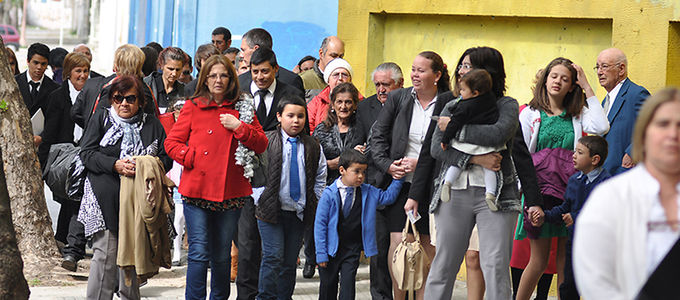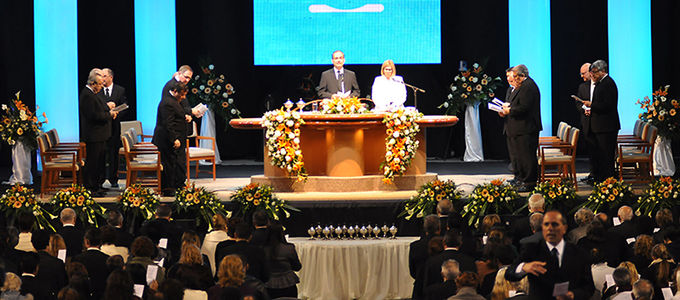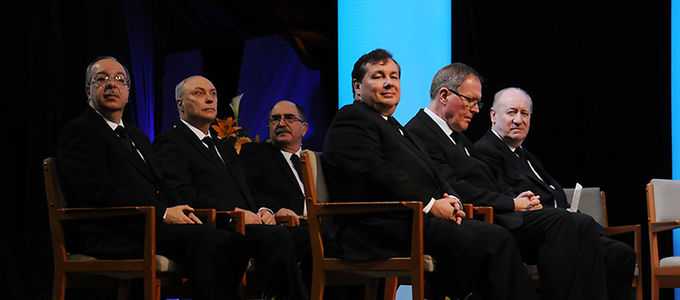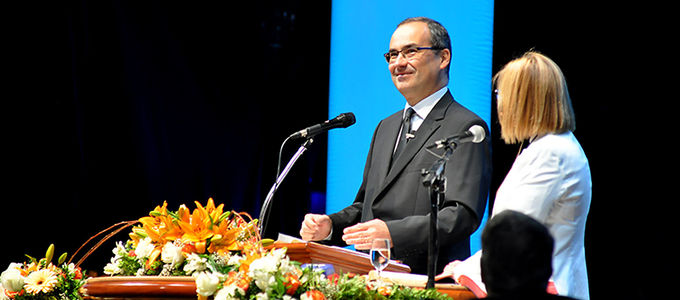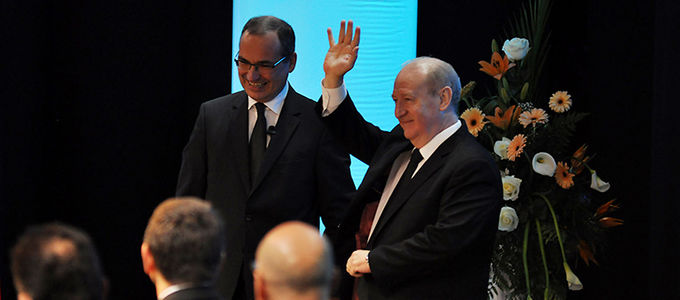Learning to declare the works of God
“Who is the better New Apostolic?” It was a challenging question that Chief Apostle Jean-Luc Schneider raised on his recent visit to Uruguay. In essence, the divine service was about life and death.
“I shall not die, but live, and declare the works of the Lord.” The divine service in Montevideo on 24 October 2015 was based on the seventeenth verse of Psalm 118. More than 5,500 visitors came together for the service at the Palacio Contador Gastón Güelfi.
Saved by the intervention of Jesus
“It is not a question of earthly life, but a question of eternal life,” the Chief Apostle said in explanation. “Eternal death is to be separated from God.” All people are sinners. In this sense, everyone is condemned to death. “And then Jesus Christ came and saved us through His sacrifice.”
The Chief Apostle drew a comparison to the woman who had committed adultery, and who was to be stoned (John 8: 3–11). “But Jesus intervened, and she was saved.” The same applies today. “Thanks to the grace of Jesus Christ we may live.”
We are not alone in tests and trials
That does not mean that we do not have to go through trials, the Chief Apostle said, and referred to the three men in the fiery furnace (Daniel 3: 1–30). God helped them. They were completely unharmed. They did not even smell of fire. “We have been given the wonderful promise that those who are faithful will not die.”
“Let us live according to the gospel of Jesus Christ,” the Chief Apostle said, adding that we are not always successful in this. To illustrate this he referred to Peter, who wanted to walk to towards the Lord on the water, but sank (Matthew 14: 22–32). “He wanted to obey the Lord, he wanted to do exactly what the Lord asked him to do, but he just could not do it,” the Chief Apostle said. But Peter called for help and Jesus saved him. “We do not have to die because of our weaknesses if we are humble enough to ask Him for grace.”
Learning to declare the works of God
“Our mission consists of declaring the works of God,” Chief Apostle Schneider said. “But this is something we have to learn,” he added, and gave a few examples in response to the question: “Are we really talking about the works of the Lord.”
- When Moses and Elijah went to the Mount of Transfiguration to meet Jesus, they did not talk about their achievements but about the things that Jesus Christ was going to achieve. “What about us? Let us speak about the works of God and not about our own works.”
- When the congregation in Jerusalem was persecuted and scattered, these first Christians did not speak about their suffering and persecution, but instead proclaimed the glad tidings of the gospel of Jesus. “Let us declare the works of God and tell everybody what great things God has done on us.”
- The Bible does not tell us what crime the repentant criminal had committed who was crucified with Jesus. “We do not know why this man was sentenced to death.” His crime was of no importance. Important was that Jesus forgave him. “Let us talk about the grace of Jesus Christ instead of talking about the sins of our neighbour.”
- The church at Corinth was divided. The faithful had been baptized by various Apostles and followed different traditions. But Paul appealed to them to speak with one voice and to glorify the Lord.
Who is the better New Apostolic?
“The same applies to our Church,” the Chief Apostle said, and came to the last aspect. There certainly are different views: “This is our tradition. This is how we are New Apostolic.” This can certainly raise debates: “Who is the better New Apostolic?”
“The preparation of the bride is not a question of tradition or culture. It is not a question of the kinds of songs that we sing, the way we dress, the way we live our New Apostolic faith,” the Chief Apostle clearly said. “It is a question of faith, of love, and of hope.”
“Let us focus on the works of God,” the Chief Apostle said in conclusion. “Let us declare the works of God—what He does, not what we do—and talk about the works of grace and of love.”
Article info
Author:
Date:
Keywords:
Andreas Rother
18.11.2015
Uruguay,
Chief Apostle,
Divine service


